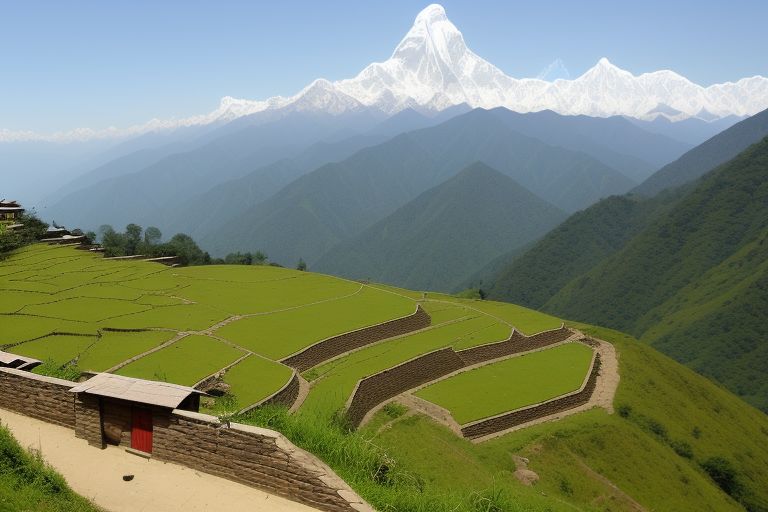In Nepal’s scenic landscapes of green valleys and raised hillsides an evolving shift is happening. Across the nation farmers are turning to sustainable farming approaches and leaving behind the conventional practices that were once common. It goes beyond just raising productivity; this transformation prioritizes an all-encompassing method that incorporates care for the environment and fair practices.
Among many who are taking on these new approaches is Kamala Thapa from the Kavre district. She used to depend largely on chemical fertilizers and pesticides. Currently I’m collaborating with nature rather than against it. Thapa uses intercropping methods by growing marigolds near her vegetables. It provides an extra means of income and doubles as a natural barrier against pest problems.
The creation and application of biochar is a key change that Thapa has introduced. By heating organic matter in an environment lacking oxygen the resulting substance is distributed over soil to improve its water storage capacity and ensure a home for beneficial microbes. Thapa points out that the health of the soil is the key issue. Using chemicals should happen only when all else fails.
Sustainable farming in Nepal is occurring alongside other movements. It forms a larger effort that merges conventional ecological wisdom with current farming techniques. In a society grappling with pest infestations and climate change effects on food production this method holds extraordinary importance.
Padam Bahadur Rana from Nepal’s southwest shows how pheromone traps can manage pests. Around his crop areas he has mounted these traps which lure male pests to destruction and stop their breeding. If proper pest control methods are absent 75% of the cucumber harvest may be lost according to Rana. He teaches these methods to a group of 75 farmers in his locality showing that effective communication is vital for the change in agriculture.
Development in agricultural sustainability does not focus exclusively on crop farming. In the dairy market farmers are exploring creative methods to augment their earnings and enhance sustainable practices. In his buffalo farm nearby Lumbini Bal Bahadur Rokay concocted vermicompost fertilizing manure using red worms. It offers better profits and is simpler than milk-making according to Rokay.
These narratives contribute to a wider pattern. Research indicates that using Good Agricultural Practices in Nepal has produced marked benefits. Crops are delivering better results and sharing resources have fallen by 31%. A total of 3.77% organic matter in soil reveals that conditions have become healthier.
The move towards sustainable farming includes obstacles. A lot of farmers with smaller plots encounter problems in securing resources and information. Organizations are taking steps to help meet this need. To enhance regenerative practices among smallholder farmers iDE provides them with the necessary information and support.
Municipal efforts are vitally important for this progress. The Nepal Organic Agriculture Development Board strives to create facilities like auction markets and research centers as well as support integrated livestock farming. These actions seek to develop a helpful framework for sustainable agriculture.
These sustainable methods influence areas outside the farm. By diminishing chemical input usage and nurturing soil quality these solutions support ecological equilibrium. The practices also aid in reducing the impact of climate change for a nation such as Nepal that is especially at risk.
In addition to that integrating sustainable agriculture boosts food security and nutritional levels in rural regions. Increased crop variety and organic methods create more nutritious foods near the community. In a nation facing the issue of malnutrition among youth particularly this matters greatly.
The economic rewards carry great importance. With higher output and decreased input expenses farmers claim to see increased earnings. Several growers are locating new distribution channels for organic crops both nationally and internationally. The economic improvement has a special impact on women farmers who frequently take charge of implementing these innovative practices.
Recognizing a need for a structured method is on the rise as the initiative moves forward. Organizations specialize in organic farming need to develop an association with qualified personnel and proper infrastructure. They emphasize the need for a three-pronged approach: Creating technology (study and training) along with resources (organic materials and storage space) is vital for the market framework.
Instead of being merely a shift in farming approaches in Nepal sustainable agriculture signifies a significant revolution in the understanding and execution of farming. The focus should shift from seeing farmers merely as food suppliers to understanding them as guardians of the earth doing vital work for conservation and community health.
Should Nepal persist along this course it might set a standard for eco-friendly agriculture across the globe. The obstacles are substantial; however the chances are just as great. Through a focus on innovation and collaboration among farmers and organizations backed by government support a green revolution awaits Nepal’s agricultural sector.
Kamala Thapa says that nurturing our land and communities is just as important as agriculture. This viewpoint reflects the essence of Nepal’s agricultural change and offers hope for a better future for its farmers and people.


